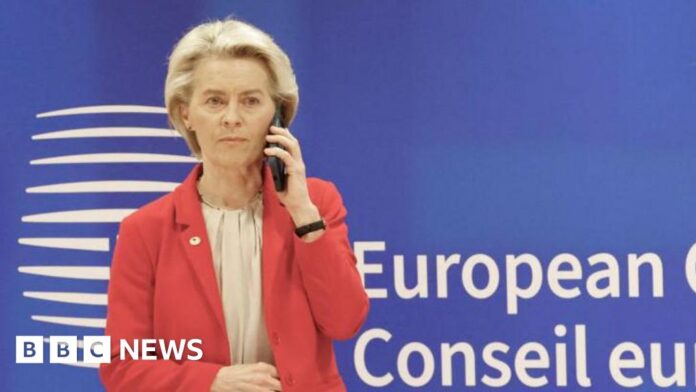The European Commission was wrong to refuse to release text messages sent by Ursula von der Leyen to the head of Pfizer during negotiations to secure Covid-19 vaccines, the EU’s top court has ruled.
The General Court said the commission had not given a plausible explanation as to why the exchanges between its president and Pfizer’s Albert Bourla could not be made public when an investigative journalist requested them in 2021.
That year, Pfizer signed billions of euros in vaccine contracts with the EU, including a deal for 1.8bn extra doses.
The content of the messages between von der Leyen and Mr Bourla remains secret, in a simmering case that has become known in Brussels as Pfizergate.
Anti-corruption group Transparency International has hailed the European Court’s ruling as a “landmark victory for transparency in the EU”, adding that it should serve as a catalyst to put an end to a “restrictive attitude to freedom of information”.
Von der Leyen became Commission president in 2019, and within a year faced the task of leading the EU’s response to the Covid pandemic.
She won a second five-year term late last year. Wednesday’s ruling threatens to damage her reputation, because of the apparent lack of transparency surrounding the Pfizer vaccine deal, in which she played such a significant role.
The Commission said it would closely study the ruling and consider its next steps, but it insisted that transparency had “always been of paramount importance“.
The controversy erupted in April 2021, when New York Times journalist Matina Stevis revealed how Ursula von der Leyen had negotiated privately with the Pfizer boss after his German partner BioNTech won regulatory approval for its Covid drug.
The article spurred investigative journalist Alexander Fanta, who worked for a German publication, to use a Freedom of Information request to see the exchange of messages between January 2021 and May 2022. But the European Commission turned him down, saying it did not have the documents.
Under the Commission’s transparency rules, all staff including the president, have to archive their documents.
However, mobile text messages are a grey area, and the case has largely hinged on whether or not they should be considered as important records.
One EU official argued this week that SMS messages were not “systematically considered public documents” and not recorded as such.
Fanta took the case to the European Ombudsman in 2021, where an inquiry found that the Commission’s failure to look for the text messages beyond its usual record-keeping amounted to maladministration.
Stevis and the New York Times followed up, and when the messages were still not released, they took the European Commission to court.
Ruling on Stevis’s challenge, the court said on Wednesday that the EU’s executive had relied “either on assumptions or on changing or imprecise information”, while the journalist and the New York Times had succeeded in rebutting their claims.
The court said that if a presumption was rebutted then it was up to the Commission to prove that documents either did not exist or it did not possess them.
The Commission had not clarified whether or not the text messages had been deleted, the court ruled, and if they had been deleted, whether that was done deliberately or whether von der Leyen had since changed her mobile phone.
